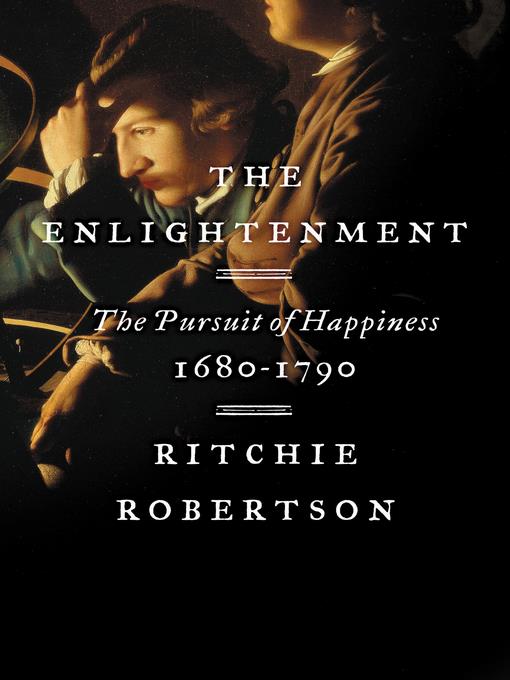
The Enlightenment
The Pursuit of Happiness, 1680-1790
کتاب های مرتبط
- اطلاعات
- نقد و بررسی
- دیدگاه کاربران
نقد و بررسی

November 1, 2019
Oxford professor Robertson, a steady reviewer for the Times Literary Supplement, offers a revisionist view of the Enlightenment as more than the formative era when Europe embraced reason. Instead, he argues, Enlightenment thinkers were looking for a way to make life happier, with Diderot's famed Encyclopédie illustrating handicrafts and trades that eased people's daily struggles and others speaking out against the brutal injustice of capital punishment, serfdom, and more. With a 100,000-copy first printing.
Copyright 2019 Library Journal, LLC Used with permission.

Starred review from October 19, 2020
The so-called “Age of Reason” also put emotion and conscience at the center of a new social ideology, according to this sweeping study of the Enlightenment. Robertson (Goethe: A Very Short Introduction), a professor of German at Oxford University, defends Enlightenment thinkers against criticisms from the reactionary right and the postmodern left. Rather than preaching an arid rationalism, he contends, “Enlighteners” extolled sympathy and innate moral feelings as “the glue holding society together” and played on human emotions to support the abolition of capital punishment and slavery. They also were eager to reconcile science with belief in God; preferred persuasion and reform to violent change and state regimentation (most, Robertson claims, were antagonistic to the French Revolution); put empirical evidence and individual freedom above doctrine and authority; and held out happiness as the ultimate goal of inquiry and policy. Robertson’s far-flung thematic survey probes the work of philosophers and ideologues, among them Thomas Jefferson, Voltaire, and Immanuel Kant, and expertly interprets the period’s art and literature, including Samuel Richardson’s melodramatic novel Clarissa, which set all of Europe to weeping. Thanks to Robertson’s elegant prose and lucid analyses, this massive and deeply erudite work serves as a stimulating and accessible introduction to a watershed period in the intellectual development of the West.

December 1, 2020
A long, thoroughly satisfying history of an era that was not solely about reason but was "also the age of feeling, sympathy and sensibility." Robertson, a professor of German at Oxford, has clearly read all the original sources and most modern scholars and arrived at his own conclusions, which are alternately unsettling and stimulating and consistently engaging. He begins by questioning the picture of the Enlightenment as an "age of reason." In fact, obtaining truth through logic and calculation was an old tradition. The ancients denigrated observation because human senses were imperfect. Augustine condemned curiosity as an insult to God. Robertson prefers to consider this era as an age of "good sense." Thinkers began to examine time-honored institutions such as government or the church for evidence that they achieved their purpose: human well-being or "happiness" as expressed by the Declaration of Independence. This period also saw the scientific revolution, and Robertson delivers a masterly overview, but he devotes far more text to religion, which, unlike science, preoccupied almost everyone. Despite the belief among some conservatives today, it was not an era of irreligion. Almost all Enlighteners believed that "God had planned the universe in accordance with laws (which had recently been discovered by Isaac Newton), and had then left it to run its orderly course. Only a small minority thought there was no God, and they took care not to advertise their skepticism." The author covers atheism in only nine pages. Except for the near absence of politics, war, and trade, this is a magisterial history of Europe and the West during this period, featuring more than 100 chapters, each rarely longer than 10 pages, and offering delightful analyses of its ideas, individuals, and controversies. Other authors compose entire volumes on medicine, child-rearing, the American Revolution, and women's history; innumerable biographies examine Voltaire, Hume, Gibbon, Rousseau, Adam Smith, and lesser-known contemporaries. Robertson delivers his thoughts on each in short chapters, most of them jewels. An entirely absorbing doorstop history of ideas.
COPYRIGHT(2020) Kirkus Reviews, ALL RIGHTS RESERVED.

March 1, 2021
Robertson argues in his robust re-examination of the Enlightenment that the so-called Age of Reason was also very much an age of empathy, during which new ways of thinking about humanity were shaped by newfound attention to emotion and individual experience. Traditional accounts of the European eighteenth century have emphasized scientific advancement, the rejection of religion, and France. Robertson allows for more complexity, sketching the Enlightenment as a sprawling movement in which developments in different intellectual spheres overlapped in a pursuit of greater human happiness. The new "science of man" (David Hume's idea) and new means of social and cross-cultural interaction prompted a new focus on humanitarian values. Social reforms, including opposition to slavery, followed. A scholar of German literature, Robertson underscores contributions from Herder, Lessing, and Schiller, among other German speakers. But the book's most fascinating insights connect popular novels--Rousseau's Julie, or The New Heloise, Goethe's The Sorrows of Young Werther, and Samuel Richardson's Clarissa--to a "sea change in sensibility, in which people became more attuned to other people's feelings." The result is a fresh and expansive discussion of the philosophical substrate from which many cherished ideals first sprouted and a potent defense of an era that has been much piled-upon of late.
COPYRIGHT(2021) Booklist, ALL RIGHTS RESERVED.

























دیدگاه کاربران